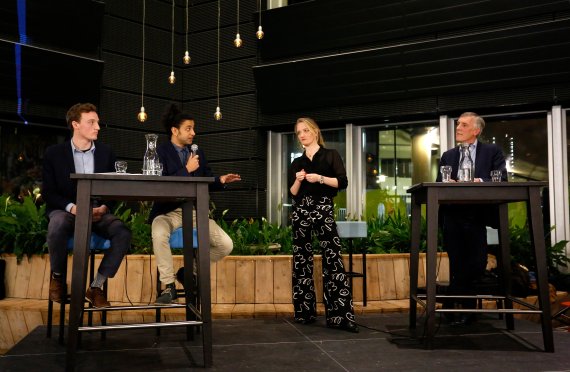Moderator Simone Ritzer and initiator Kamiel Verhelst from Extinction Rebellion (XR) look back on the climate policy dialogue between the Executive Board and Extinction Rebellion of last Monday, 13 January. ‘Members of the WUR community should be more actively involved in decision making.’
Simone Ritzer:
‘Activist groups such as Extinction Rebellion have the power to broaden the dialogue. If everyone has a nuanced opinion, nothing will change. However, it is also necessary for activist groups to be confronted with opinions that differ from their own, through engaging in dialogue. The large turnout for this event clearly shows a need for follow-up. Some two hundred and fifty participants have made it clear they want WUR to communicate more clearly on the impact, severity and scale of climate change. Although improving the narrative on climate change is primarily a responsibility of the communications department, WUR is certainly open to students’ input on this matter.’
Influence
‘One thing that stood out is that students are unaware of their own degree of influence. For example, a group of students suggested that the university should include climate change in more subjects. Whereupon another student said: “Listen, I am a member of the programme committee. We also have an influence.” The question is, how do we make students aware of their own influence?’
Initiative
‘Extinction Rebellion felt that the Executive Board took too long to invite them to talk, and eventually initiated the dialogue themselves. That, in my opinion, is how it should be: They want something to change and are therefore responsible for initiating it. As a programme manager, it falls within my abilities to organise all types of events, but a successful dialogue will only be achieved if participants consider the issue sufficiently important to take action. That’s why I appeal to our community: Do you seek changes? Take the initiative and come see me so we can discuss how to strengthen each other.’
‘One of the participants lanched the idea of organising a dialogue with the Executive Board several times a year. I think that’s a great idea, as long as the dialogues focus on issues that affect the WUR community. We would have to gauge what subjects students and faculty consider important, and then discuss these issues.’
Kamiel Verhelst:
‘The turnout for this event was amazing, and I feel we were able to put forward a few important concerns. Unfortunately, the available time was limited, which prevented us from discussing all the issues we wanted to. We would have liked to discuss the role the university plays within society in more detail. But all in all, I think we did a good job.’
Communication
‘Part of me understands that the university doesn’t want to make an explicit statement by declaring a climate emergency. However, I believe there is substantial reason to communicate more clearly on the scope and severity of the climate crisis. At present, this does not seem to be a priority in WUR’s communication strategy, where climate change is primarily seen as something to be resolved technologically. It is essential that the climate crisis is exemplified from various different perspectives in WUR’s communication.’
More participation needed
‘What I take away from last Monday’s event is that there is a real need to establish a culture where members of the WUR-community are more actively involved in decision making. A better and more transparent participation system is required. For that to happen, it is essential that we engage in conversations. Simone Ritzer (moderator, Ed.) says that people wanting to have a dialogue about an issue are responsible for taking initiatives. I agree with her, however, at the same time, the university is responsible for facilitating such initiatives. We would welcome a more regular interaction with the board so that the community is better informed about their work, and how they can influence the university’s course.’

 Photo: Aldo Allessie
Photo: Aldo Allessie